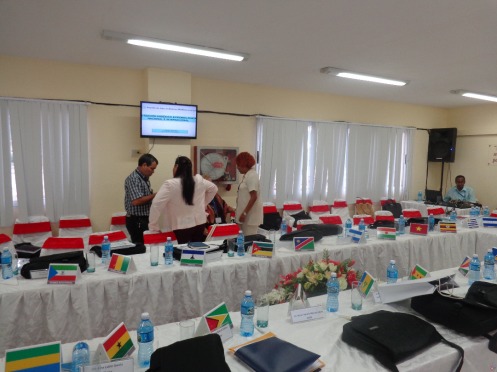
Juan Juan Almeida, 25 July 2017 — The Cuban government brought together all the heads of its overseas medical missions to analyze the work done during the previous year, provide guidelines and outline new strategies. It was the seventeenth such meeting of its kind.
The event was held from July 17 to 21 at the Central Medical Cooperation Unit (UCCM), located at KM 2.5 Carretera a la Cujae. It was headed by Minister of Public Health Dr. Roberto Morales Ojeda, Deputy Minister Marcia Coba Ruiz, UCCM Director Dr. Regla Angulo Pardo, leaders of the Communist Party, the secretary general of the health services trade union, officials from Cuban Medical Services, various heads of provincial departments from Medical Collaboration, and officials from the Ministry of the Interior overseeing the work the Ministry of Public Health (MINSAP).
The Cuban medical mission program got its start on May 23, 1963, when a group of doctors and health care technicians traveled to Algeria. Since then, Cuba has expanded the health service to other parts of Africa as well as to Latin America and Asia.

But according to a report, “Performance of the Economic Plan during the First Half of 2017” issued by the Cuban Medical Services Company, the country earned 27% less from overseas heath care services compared to the previous year.
Desertions, love affairs between employees and foreigners, illness, lack of discipline, changes in crude oil prices, extreme fluctuations in currency exchange rates and unforeseen political developments are among the causes for this sharp decline.

The document lays out a group of measures mission directors must take to prevent desertions and defections. One measure involves increased control and monitoring of workers’ behavior such as checking the websites they visit.
The memo indicates that one of the websites most frequently visited by workers hoping to leave their missions early lists job opportunities in Europe: www.jobandtalent.com.
Heightened propaganda campaigns to attract foreign patients to Cuba, increasing the number of medical missions and reestablishing those that have closed are among the strategies that, it is hoped, will increase MINSAP’s hard currency earnings.
The work of mission directors in Venezuela, Ecuador, Guatemala, Gambia, Haiti and Qatar was recognized at the meeting. Special mention was made of Brazil, where 1,230 general comprehensive medicine specialists arrived at the start of this month, and Jamaica, where the mission will expand its workforce on August 3 with the arrival of internists, radiologists, primary care specialists, cardiologists, pulmonologists, pathologists, biomedical engineers (anesthetic, medical gas, dental) histopathologists and oncologists.
The XVII Meeting of Cuban Heads of Missions culminated with a dinner for the participants and extended congratulations to other workers who, though not directors, are carrying out the mission.
